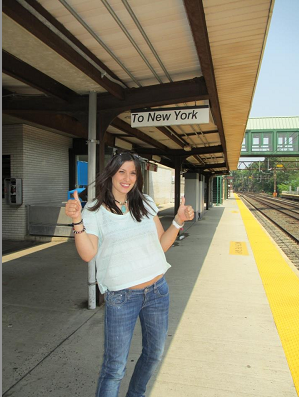Halloween in the USA! 
Halloween, the last day of October, has a special significance for children, who dress in funny or ghostly costumes and knock on neighborhood doors shouting “Trick or Treat!” Pirates and princesses, ghosts and witches all hold bags open to catch the candy or other goodies that the neighbors drop in.
Since the 800’s November 1st is a religious holiday known as All Saints’ Day. The Mass that was said on this day was called Allhallowmas. The evening before became known as All Hallow e’en, or Halloween. Like some other American celebrations, its origins lie in both pre-Christian and Christian customs.
Today school dances and neighborhood parties called “block parties” are popular among young and old alike. More and more adults celebrate Halloween. They dress up as historical or political figures and go to masquerade parties. In larger cities, costumed children and their parents gather at shopping malls early in the evening. Stores and businesses give parties with games and treats for the children. Teenagers enjoy costume dances at their schools and the more outrageous the costume the better! Certain pranks such as soaping car windows and tipping over garbage cans are expected. But partying and pranks are not the only things that Halloweeners enjoy doing. Some collect money to buy food and medicine for needy children around the world.
Symbols of Halloween
Halloween originated as a celebration connected with evil spirits. Witches flying on broomsticks with black cats, ghosts, goblins and skeletons have all evolved as symbols of Halloween. They are popular trick-or-treat costumes and decorations for greeting cards and windows. Black is one of the traditional Halloween colors, probably because Halloween festivals and traditions took place at night. In the weeks before October 31, Americans decorate windows of houses and schools with silhouettes of witches and black cats.
Pumpkins are also a symbol of Halloween. The pumpkin is an orange-colored squash, and orange has become the other traditional Halloween color. Carving pumpkins into jack-o’-lanterns is a Halloween custom also dating back to Ireland. A legend grew up about a man named Jack who was so stingy that he was not allowed into heaven when he died, because he was a miser. He couldn’t enter hell either because he had played jokes on the devil. As a result, Jack had to walk the earth with his lantern until Judgment Day. The Irish people carved scary faces out of turnips, beets or potatoes representing “Jack of the Lantern,” or jack-o’-lantern. When the Irish brought their customs to the United States, they carved faces on pumpkins because in the autumn they were more plentiful than turnips. Today jack-o’-lanterns in the windows of a house on Halloween night let costumed children know that there are
goodies waiting if they knock and say “Trick or Treat!” 
Information obtained: http://usa.usembassy.de/holidays-halloween.htm

















